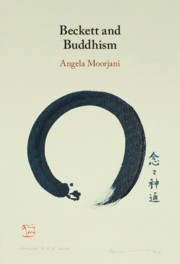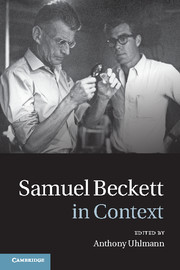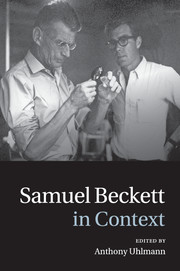Beckett and Buddhism
Beckett and Buddhism undertakes a twenty-first-century reassessment of the Buddhist resonances in Samuel Beckett's writing. These reverberations, as Angela Moorjani demonstrates, originated in his early reading of Schopenhauer. Drawing on letters and archives along with recent studies of Buddhist thought and Schopenhauer's knowledge of it, the book charts the Buddhist concepts circling through Beckett's visions of the 'human predicament' in a blend of tears and laughter. Moorjani offers an in-depth elucidation of texts that are shown to intersect with the negative and paradoxical path of the Buddha, which she sets in dialogue with Western thinking. She brings further perspectives from cognitive philosophy and science to bear on creative emptiness, the illusory 'I', and Beckett's probing of the writing process. Readers will benefit from this far-reaching study of one of the most acclaimed writers of the twentieth century who explored uncharted topologies in his fiction, theatre, and poetry.
- Reassesses the role of Schopenhauer's transmission of Eastern thought to the West and its extraordinary influence on modernist writing, art, and philosophical and psychoanalytic thinking in the first part of the 20th century
- Provides incisive new readings of Beckett's texts - prose fiction, drama, poems, and letters - from the late 1930s to the 1980s, based on the Buddhist echoes uncovered in his writings and their intersection with Western thought
- Introduces philosophical and religious concepts - both Eastern and Western - in clear and comprehensible terms.
Reviews & endorsements
‘Readers interested in the transmission of Eastern thought in modernist texts will find this exploration of the congruence of Beckett’s texts with Buddhist thought useful and informative … Recommended.’ J. S. Baggett, Choice Connect
'Moorjani is a scholar doing a scholar's work, and the results are exhilarating' Jean-Michel Rabaté, University of Pennsylvania
‘… the study [goes] a long way toward illuminating things that have previously and notoriously puzzled readers of Beckett, from the paradoxical style to the seeming pessimism that pervades his works. … Moorjani’s study deserves to be known to readers not only in twentieth-century literary studies but also in world literature, comparative literature, and beyond.’ Lidan Lin, Modern Language Quarterly
‘… this impressive monograph not only continues Moorjani’s long career of path-breaking contributions to Beckett studies, but it achieves a mastery of material and persuasiveness of exposition that few researchers can ever hope to attain.’ Douglas Atkinson, The Beckett Circle
‘Beckett and Buddhism explores the 'imaginative dialogue' between Samuel Beckett's writing and Buddhist and Eastern thought. Drawing on published correspondence and prodigious archival material both to confirm Schopenhauer as a source of Beckett's knowledge of Buddhism and to substantiate her research, Angela Moorjani traces back Buddhist influences on the author's early fiction and meticulously uncovers their reverberations in his entire oeuvre.’ Nadia Louar, L'Esprit Créateur
‘Moorjani undertakes 'to refute the charge of nihilism against Beckett' (p. 76) by focussing on how the effect of emptiness or emptying (a key Buddhist notion) is realized with powerful aesthetic and spiritual impact in particular texts, underlining in particular the role of meditation in Beckett's later works and the value attached to the void as a longed-for 'home'.' Joseph S. O'Leary, Journal of Irish Studies
Product details
July 2021Hardback
9781316519691
260 pages
235 × 159 × 19 mm
0.53kg
Available
Table of Contents
- Introduction: Buddhism, Schopenhauer, Beckett: Influence Affinity, Relay?
- 1. Schopenhauer's Buddhism Revisited: Recent Archival Evidence
- 2. East-West Dialogue via Schopenhauer
- 3. Buddhist and Mystic Threads in the Early Fiction
- 4. Beckett's Paradoxical Logic through Buddhist and Western Lenses
- 5. The Coincidence of Contraries and Noh Drama
- 6. The No-Self Staged and Voices from Elsewhere
- 7. Rebirth and the Buddhist Unborn in the Fiction and Drama
- 8. Dreaming 'all away' in the Final Texts�.




